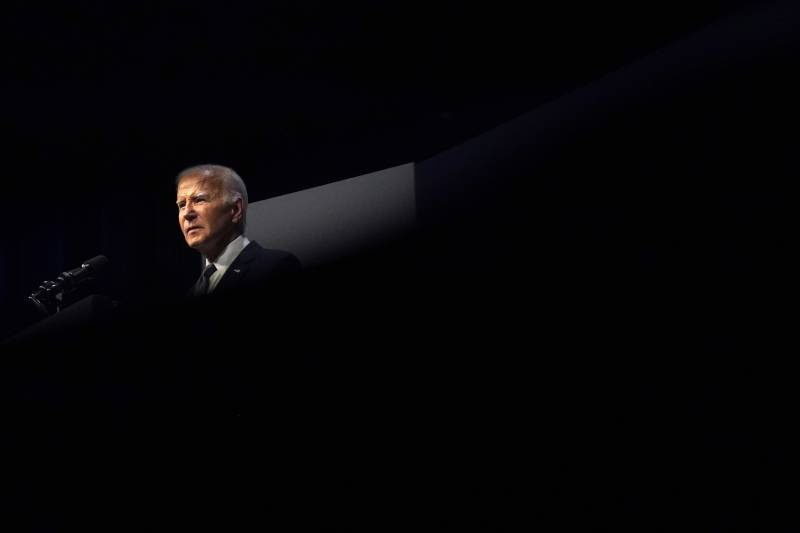But others, including, reportedly, former House Speaker Nancy Pelosi, believe that Harris would be a stronger candidate if she wins the nomination publicly — allowing her to make her case to the American people and avoiding any perception that the party elites are handpicking a nominee. Some Democrats also believe that an open race between now and the August convention would give the party an opportunity to dominate airwaves, capture the nation’s attention and reshuffle the dynamics in a presidential race that has turned many voters off until now.
Harris, for her part, said in a statement after Biden announced his decision that she intends “to earn and win this nomination” and will continue to campaign “across the country, talking with Americans about the clear choice in this momentous election.”
The Democratic Party changed its nominating process after the 1968 convention, which was marked by violent crackdowns by police on anti-Vietnam War protestors and conflict among delegates — disagreement that played out on TV. Republican Richard Nixon won that fall, defeating Democratic Vice President Hubert Humphrey.
Starting in 1972, Democratic state caucuses and primaries became more important in the nominating process, making it less likely that floor fights like the one in 1968 would play out at the nominating convention.
But party delegates — a mix of party activists and insiders — still have a role in making the nomination official. Here’s what to know about the current rules governing a Democratic National Convention and its nominating process (PDF).
Because Biden won the state primaries, the vast majority of the 4,700 Democratic delegates that will vote on the nomination are “pledged” to him
Biden didn’t face a serious Democratic challenger this year, and — as he pointed out in a recent letter to members of Congress — received “over 14 million votes, 87% of the votes cast across the entire nominating process.”
That means under party rules, those nearly 3,900 delegates are pledged to Biden and under DNC rules “shall in all good conscience reflect the sentiments of those who elected them.”
While primary voters choose the nominee, it’s still not official until the delegates vote
Presidential nominations are made official by a roll call vote of delegates. The pledged delegates are the only ones allowed to vote on the first roll call; if no one gets a majority of votes, the nominating contest will move to a second ballot, and the other 800 or so delegates can also vote. Balloting continues until a nominee is finally selected by a majority of delegates.
Even with Biden supporting Harris, other Democrats can also be nominated at the convention
In order to be considered for the nomination, a candidate needs to gather at least 300 signatures from delegates from six states. Then, each candidate would be allowed 20 minutes of nominating speeches before delegates begin voting.
It seems likely that Democrats would coalesce behind the vice president if Biden indicates that’s his preference — but nothing would necessarily stop another candidate from trying to whip enough delegates to also vie for the nomination.
The process could potentially play out before the August convention.
The DNC had planned to nominate Biden before the DNC begins on August 19, because state law in Ohio previously required that political parties name their official nominee 90 days before the general election — which this year fell on August 7, almost two weeks before the Democratic convention. So before Biden’s disastrous debate performance and calls for him to drop out began mounting, the DNC decided they would do the official nomination by virtual roll call in early August.
That doesn’t appear to be necessary any more — Republicans in Ohio recently passed a bill, which was signed by Governor Mike DeWine, that relaxed the deadline. But Democratic Party leaders had still been moving forward with the earlier nomination vote, arguing that outstanding lawsuits over the legislation make the earlier vote necessary. Before today’s Biden announcement, the DNC had scheduled the vote to start as early as August 1, more than two weeks before the convention begins.
It’s possible that they could do the same in an open nominating process: Ask delegates to vote ahead of the convention, then unveil a winner in Chicago.
Who are the delegates — and can Democratic leaders influence who they vote for in an open convention?
Most delegates are party activists, elected by their peers. There are also 700 “superdelegates” (PDF) — members of the House and Senate, Democratic governors, DNC members and all former Democratic presidents, vice presidents, congressional leaders and DNC chairs.
But since “regular” delegates far out number superdelegates, they would be the ones picking a nominee if Biden steps aside. And once an open convention begins, party leaders (including Biden) have no official power to dictate who they vote for.
That means even if the president asks the party to nominate Harris, things could get chaotic at the convention in August.

